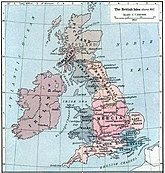
Back Roll rouaned Northumbria Breton Liste der Könige von Northumbria German Κατάλογος μοναρχών της Νορθουμβρίας Greek Anexo:Reyes de Northumbria Spanish Liste des rois de Northumbrie French מלכי נורת'מבריה HE Northumbria uralkodóinak listája Hungarian Re di Northumbria Italian 노섬브리아 국왕 Korean Index regum Northanhymbrorum Latin
| This article is part of a series on |
| the kings of Anglo-Saxon England |
|---|
 |
Northumbria, a kingdom of Angles, in what is now northern England and south-east Scotland, was initially divided into two kingdoms: Bernicia and Deira. The two were first united by king Æthelfrith around the year 604, and except for occasional periods of division over the subsequent century, they remained so. The exceptions are during the brief period from 633 to 634, when Northumbria was plunged into chaos by the death of king Edwin in battle and the ruinous invasion of Cadwallon ap Cadfan, king of Gwynedd. The unity of the Northumbrian kingdoms was restored after Cadwallon's death in battle in 634.
Another exception is a period from about the year 644 to 664, when kings ruled individually over Deira. In 651, king Oswiu had Oswine of Deira killed and replaced by Œthelwald, but Œthelwald did not prove to be a loyal sub-king, allying with the Mercian king Penda; according to Bede, Œthelwald acted as Penda's guide during the latter's invasion of Northumbria but withdrew his forces when the Mercians met the Northumbrians at the Battle of Winwaed. After the Mercian defeat at Winwaed, Œthelwald lost power and Oswiu's own son, Alchfrith, became king in his place. In 670, Ælfwine, the brother of the childless king Ecgfrith, was made king of Deira; by this point the title may have been used primarily to designate an heir. Ælfwine was killed in battle against Mercia in 679, and there was not another separate king of Deira until the time of Norse rule.